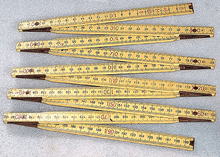Centimetre
| Centimetre | |
|---|---|
 a carpenters' ruler with centimetre divisions | |
| Unit information | |
| Unit system | metric |
| Unit of | length |
| Symbol | cm |
| Unit conversions | |
| 1 cm in ... | ... is equal to ... |
| SI units | 10 mm |
| imperial & US system | ~0.3937 in |
| Look up centimetre in Wiktionary, the free dictionary. |
A centimetre (international spelling as used by the International Bureau of Weights and Measures; symbol cm) or centimeter (American spelling) is a unit of length in the metric system, equal to one hundredth of a metre, centi being the SI prefix for a factor of 1⁄100.[1] The centimetre was the base unit of length in the now deprecated centimetre–gram–second (CGS) system of units.
Though for many physical quantities, SI prefixes for factors of 103—like milli- and kilo-—are often preferred by technicians, the centimetre remains a practical unit of length for many everyday measurements. A centimetre is approximately the width of the fingernail of an average adult person.
Equivalence to other units of length
1 centimetre = 10 millimetres = 0.01 metres = 0.393700787401574803149606299212598425196850 inches (There are exactly 2.54 centimetres in one inch.)
One 1 millilitre is defined as one cubic centimetre, under the SI system of units.
Other uses
In addition to its use in the measurement of length, the centimetre is used:
- sometimes, to report the level of rainfall as measured by a rain gauge [2]
- in the CGS system, the centimetre is used to measure capacitance, where 1 cm of capacitance = 1.113×10−12 farads[3]
- in maps, centimetres are used to make conversions from map scale to real world scale (kilometres)
- to represent second moment of areas (cm4)
- as the inverse of the kayser, a CGS unit, and thus a non-SI metric unit of wavenumber: 1 kayser = 1 wave per centimetre; or, more generally, (wavenumber in kaysers) = 1/(wavelength in centimetres). The SI unit of wavenumber is the inverse metre, m−1.
Unicode symbols
For the purposes of compatibility with Chinese, Japanese and Korean (CJK) characters, Unicode has symbols for:[4]
- centimetre (㎝) – code 339D
- square centimetre (㎠) – code 33A0
- cubic centimetre (㎤) – code 33A4
They are mostly used only with East Asian fixed-width CJK fonts, because they are equal in size to one Chinese character.
See also
- 1 E-2 m
- Conversion of units, for comparison with other units of length
- Reciprocal centimetre
- Orders of magnitude (length)
References
- ↑ "Decimal multiples and submultiples of SI units". Bureau International des Poids et Mesures. 2014. Retrieved 5 July 2015.
- ↑ Rain Measurement, Rain Gauge, Wireless Rain Gauge, Rain Gage, Rain Gauge Data
- ↑ Capacitance - from Eric Weisstein's World of Physics
- ↑ CJK Compatibility excerpt from The Unicode Standard, Version 4.1.
- CJK Compatibility excerpt from The Unicode Standard, Version 4.4 and co-exterior users.